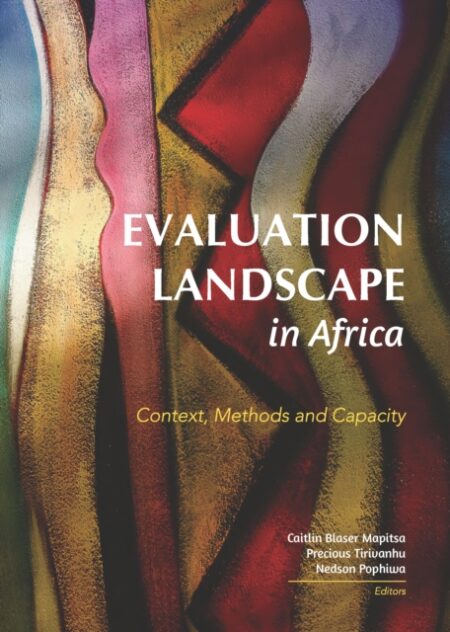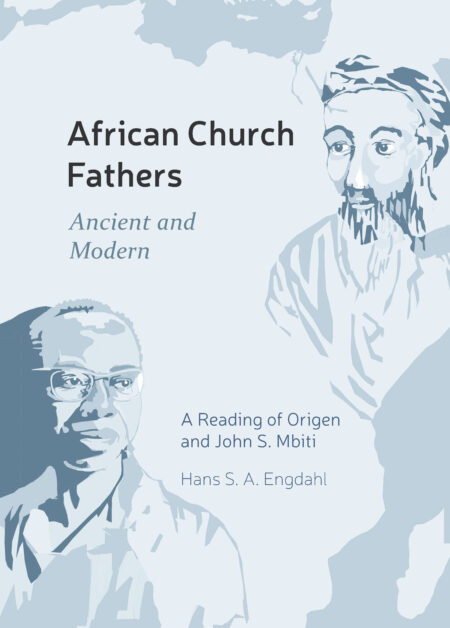-
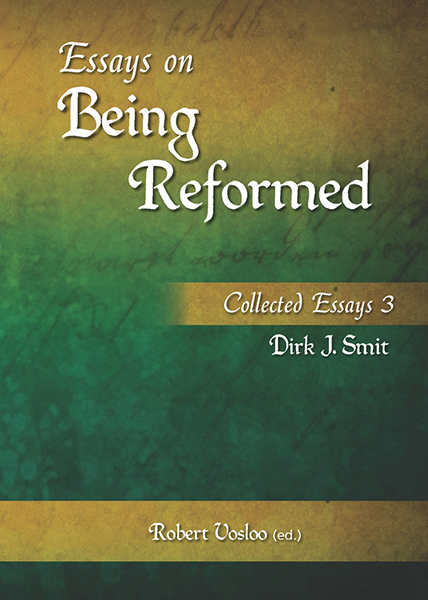
Essays on Being Reformed
0R540,00What does it mean to be Reformed Christians in the world today ? and in Africa and South Africa? What does it mean to commemorate the legacy of John Calvin (1509-1564) after 500 years ? in a modern world characterised by democracy, by popular notions of human dignity and human rights, by worldwide struggles for individual freedoms and for social justice, by a global economy in crisis ? when social historians argue about the lasting contribution of Calvin and his followers precisely with respect to all these modern phenomena?
The 28 essays by Dirkie Smit selected for this volume deal with such questions.
-

Ethical Leadership
0R240,00?Ethical Leadership and the Challenges of Moral Transformation is both challenging and timely. It is published at a critical period in the history of South Africa and the world as we face leadership challenges in the political and economic context. ?I recommend this book to anybody interested in new engagements with the real world through the art of morality.? – Prof H Russel Botman
-

Ethics and Professionalism
0R270,00Immoral, unethical conduct of politicians and public officials is a global scourge of the present day. The South African government is leading the battle against corruption in the public sector, and it must be supported by officials educated to recognise, and enabled to combat, every appearance of this pestilence. Ethics and Professionalism is essential equipment for such education. Having been constructed on the principles of knowledge progression and outcomes-based education, it sets out explaining the meaning of ethics and its importance for public officials.
-
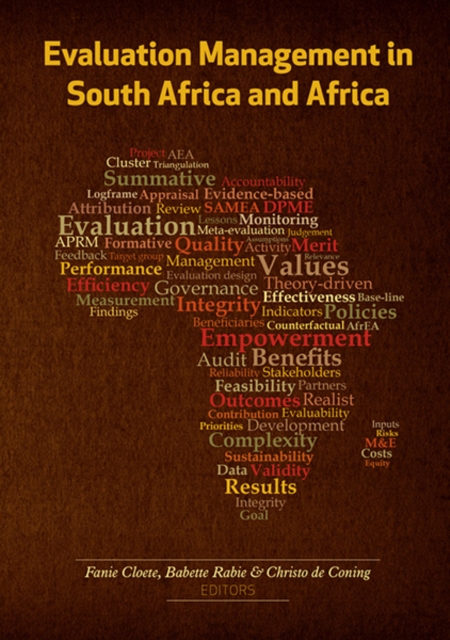
Evaluation Management in South Africa and Africa
0R665,00This blind peer reviewed book systematically records, analyses and assesses for the first time in a single volume the implications of the global development and management of professional evaluation for the African continent. The book deals with the most strategic contemporary evaluation themes. Each of these themes contains discussions of theoretical issues illustrated with one or more short case studies, while selected longer case studies and other relevant documentation are also taken up in annexures at the end of the book. The book therefore comprises a guide to best M&E practices for purposes of systematic policy, programme and project evaluations. It is suitable for both professional M&E institutionalisation and capacity-building projects as well as for evaluation information dissemination and education at different levels in the public, private and voluntary sectors in society, especially in a developmental context.
eBook: View eBook Version
-

Evaluation Management in South Africa and Africa
0R530,00This blind peer reviewed book systematically records, analyses and assesses for the first time in a single volume the implications of the global development and management of professional evaluation for the African continent.The book deals with the most strategic contemporary evaluation themes. Each of these themes contains discussions of theoretical issues illustrated with one or more short case studies, while selected longer case studies and other relevant documentation are also taken up in annexures at the end of the book. The book therefore comprises a guide to best M&E practices for purposes of systematic policy, programme and project evaluations. It is suitable for both professional M&E institutionalisation and capacity-building projects as well as for evaluation information dissemination and education at different levels in the public, private and voluntary sectors in society, especially in a developmental context.
Print: View Print Version
-

Evoking Transformation
0R645,00OThis book is especially timely and will be very influential in the acknowledgment of the importance of institutional transformation in the context of heritage in postcolonial universities in South Africa, Africa, and globally.O
Dr Mathias Alubafi Fubah
Human Sciences Research Council
OThis book is a significant contribution to Higher Education globally in doing Transformation and doing change in Institutional Culture. It is a powerful reference point and resource for transformation offices/social justice units in South Africa and globally as we continue to engage with the Hard Science of Change. Visual Redress provides insight into the specific choices made by Stellenbosch University in relation to its location and healing institutionally harmed communities. We must learn from this as we continuously engage with our praxis.O
Dr Bernadette Judith Johnson
Director: Transformation and Employment Equity Office
University of the Witwatersrand
eBook: View eBook Version
-

Evoking Transformation
0R515,00“This book is especially timely and will be very influential in the acknowledgment of the importance of institutional transformation in the context of heritage in postcolonial universities in South Africa, Africa, and globally.”
Dr Mathias Alubafi Fubah
Human Sciences Research Council
“This book is a significant contribution to Higher Education globally in doing Transformation and doing change in Institutional Culture. It is a powerful reference point and resource for transformation offices/social justice units in South Africa and globally as we continue to engage with the Hard Science of Change. Visual Redress provides insight into the specific choices made by Stellenbosch University in relation to its location and healing institutionally harmed communities. We must learn from this as we continuously engage with our praxis.”
Dr Bernadette Judith Johnson
Director: Transformation and Employment Equity Office
University of the Witwatersrand
Print: View Print Version
-

Exchanging Symbols
0R260,00This book comprises eight essays that consider the politics and polemics of monuments in Africa in the wake of the #RhodesMustFall movement in 2015. The removal of the Rhodes statue from UCT main campus is the pivot on which the discussion of monuments as heritage in South Africa turns. It raised a number of questions about the implementation of heritage policy and the unequal deployment of memorials in the South African and other postcolonial landscapes. The essays in this volume are written by authors coming from different backgrounds and different disciplines. They address different aspects of this event and its aftermath, offering some intensive critique of existing monuments, analysing the successes of new initiatives, meditating on the visual resonances of all monuments and attempting to map ways of moving forward.EE
Print: View Print Version
-

Exchanging Symbols
0R320,00EThis book comprises eight essays that consider the politics and polemics of monuments in Africa in the wake of the #RhodesMustFall movement in 2015. The removal of the Rhodes statue from UCT main campus is the pivot on which the discussion of monuments as heritage in South Africa turns. It raised a number of questions about the implementation of heritage policy and the unequal deployment of memorials in the South African and other postcolonial landscapes. The essays in this volume are written by authors coming from different backgrounds and different disciplines. They address different aspects of this event and its aftermath, offering some intensive critique of existing monuments, analysing the successes of new initiatives, meditating on the visual resonances of all monuments and attempting to map ways of moving forward.E
eBook: View eBook Version
-
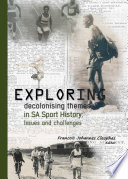
Exploring decolonising themes in SA sport history
0R260,00In an effort to understand how the absences of the colonial subject in sport were engineered and how colonial narratives became fixed in the literature and minds of South Africans, Exploring Decolonising Themes in SA Sport History: Issues and Challenges attempts a full-scale restructuring and rewriting of the history of sport in South Africa to include black South Africans, and thereby places them on the forefront of a colonial history. The book includes the articulations of academic researchers, professionals and retired sportspeople who were requested to explore their unique areas of interest in sport from the perspective of themes in South African sport history. They place themselves at the centre of discourses that dispel myths that blacks had no sport significance prior to 1994. The book ultimately challenges this spirit of the past where there was only one narrative ? a white male sport tradition. Rather than adapting past colonial and apartheid narratives, this work seeks to fundamentally replace and supersede them.

